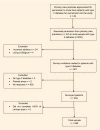Preferences of people with Type 2 diabetes for diabetes care: a discrete choice experiment
- PMID: 31001855
- PMCID: PMC7586937
- DOI: 10.1111/dme.13969
Preferences of people with Type 2 diabetes for diabetes care: a discrete choice experiment
Abstract
Aims: Limited knowledge exists on the preferences of people with Type 2 diabetes towards diabetes care. Consequently, these care preferences cannot yet be considered in the development of tailored diabetes care approaches. Therefore, this study aimed to assess care preferences and their determinants in people with Type 2 diabetes.
Methods: A discrete choice experiment was conducted to elicit people's preferences. People with Type 2 diabetes, treated in 30 Dutch primary care practices, were asked to choose repeatedly between two hypothetical diabetes care packages, which differed in six attributes: role division in daily diabetes care planning, lifestyle education method, type of medication management support, consultation frequency, emotional support and time spend on self-management. A mixed-logit model was used to estimate the relative importance of the included attributes. Preference heterogeneity among people with different person- and disease-related characteristics was investigated.
Results: In total, 288 participants completed the experiment. They preferred to plan their daily diabetes care together with a healthcare provider, to receive individual lifestyle education, medication and emotional support from a healthcare provider, one consultation visit every 3 months and to spend less time on self-management. Participants did not prefer to receive emotional support from a psychologist. Heterogeneity in preferences could partly be explained by differences in sex, education level and glucose-lowering drug use.
Conclusion: People with Type 2 diabetes show a preference for traditional care models. Emotional support was identified by participants as the most important attribute. It is therefore important to adequately guide them when changes in diabetes care organization are implemented.
© 2019 The Authors. Diabetic Medicine published by John Wiley & Sons Ltd on behalf of Diabetes UK.
Figures
Similar articles
-
Preferences of people with diabetes for diabetes care in Germany: a discrete choice experiment.Expert Rev Pharmacoecon Outcomes Res. 2024 Oct;24(8):997-1007. doi: 10.1080/14737167.2024.2369293. Epub 2024 Jun 21. Expert Rev Pharmacoecon Outcomes Res. 2024. PMID: 38874180
-
A discrete-choice experiment to elicit preferences of patients with epilepsy for self-management programs.Epilepsy Behav. 2018 Feb;79:58-67. doi: 10.1016/j.yebeh.2017.11.015. Epub 2017 Dec 15. Epilepsy Behav. 2018. PMID: 29248866
-
Type 2 diabetes patients' preferences and willingness to pay for lifestyle programs: a discrete choice experiment.BMC Public Health. 2013 Nov 29;13:1099. doi: 10.1186/1471-2458-13-1099. BMC Public Health. 2013. PMID: 24289831 Free PMC article.
-
Psychological interventions to improve self-management of type 1 and type 2 diabetes: a systematic review.Health Technol Assess. 2020 Jun;24(28):1-232. doi: 10.3310/hta24280. Health Technol Assess. 2020. PMID: 32568666 Free PMC article.
-
Using discrete-choice experiments to elicit preferences for digital wearable health technology for self-management of chronic kidney disease.Int J Technol Assess Health Care. 2022 Oct 26;38(1):e77. doi: 10.1017/S0266462322003233. Int J Technol Assess Health Care. 2022. PMID: 36286261 Review.
Cited by
-
Pharmacists' preferences for the provision of services to improve medication adherence among patients with diabetes in Indonesia: Results of a discrete choice experiment.Health Soc Care Community. 2022 Jan;30(1):e161-e174. doi: 10.1111/hsc.13423. Epub 2021 May 19. Health Soc Care Community. 2022. PMID: 34009714 Free PMC article.
-
Powerful together with diabetes, a group-based self-management intervention for patients with type 2 diabetes from lower educational groups: study protocol for a hybrid type 2 evaluation.BMJ Open. 2025 Jan 9;15(1):e087767. doi: 10.1136/bmjopen-2024-087767. BMJ Open. 2025. PMID: 39788779 Free PMC article.
-
The Evolving Landscape of Discrete Choice Experiments in Health Economics: A Systematic Review.Pharmacoeconomics. 2025 Aug;43(8):879-936. doi: 10.1007/s40273-025-01495-y. Epub 2025 May 21. Pharmacoeconomics. 2025. PMID: 40397369 Free PMC article.
-
Patient perspectives about treatment preferences for obesity with complications.Obes Sci Pract. 2023 Oct 29;10(1):e720. doi: 10.1002/osp4.720. eCollection 2024 Feb. Obes Sci Pract. 2023. PMID: 38263990 Free PMC article.
-
Investigating patients' preferences for new anti-diabetic drugs to inform public health insurance coverage decisions: a discrete choice experiment in China.BMC Public Health. 2022 Oct 5;22(1):1860. doi: 10.1186/s12889-022-14244-z. BMC Public Health. 2022. PMID: 36199056 Free PMC article.
References
-
- Kleefstra N, Landman GW, Van Hateren KJ, Meulepas M, Romeijnders A, Rutten GE et al Dutch diabetes prevalence estimates (DUDE‐1). J Diabetes 2016; 8: 863–865. - PubMed
-
- Hek K, Ursum J, Tol J, Verheij RA. Eerstelijnszorggebruik voor diabetes: een overzicht. Nivel Zorgregistraties eerste lijn, 2016. Available at https://www.nivel.nl/nl/zorgregistraties-eerste-lijn/zorggebruik-de-eers... Last accessed 25 April 2019.
-
- Nederlands huisartsen genootschap . NHG‐standaard Diabetes mellitus type 2 (vierde (partitiële) herziening), 2018. Available at https://www.nhg.org/standaarden/volledig/nhg-standaard-diabetes-mellitus... Last accessed 25 April 2019.
-
- Bakker K, Bilo HJG. Diabetes care in the Netherlands: now and in the future. Pract Diab Int 2004; 21: 88–91.
-
- Cebolla Garrofé B, Björnberg A, Yung Phang A. Euro Diabetes Index 2014. Marseillan, France: Health Consumer Powerhouse Ltd; 2014.
Publication types
MeSH terms
Grants and funding
LinkOut - more resources
Full Text Sources
Medical



